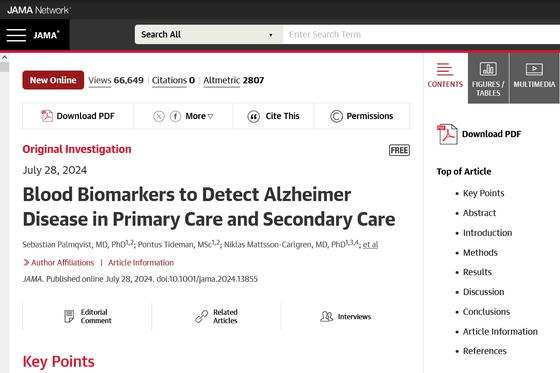Study finds blood test can accurately diagnose Alzheimer's disease 90% of the time

A research team from Sweden's Lund University has announced the results of a study that shows that a blood test can accurately diagnose Alzheimer's disease with about 90% accuracy, which is higher than conventional methods using cognitive function tests and CT scans.
Blood Biomarkers to Detect Alzheimer Disease in Primary Care and Secondary Care | Neurology | JAMA | JAMA Network
https://jamanetwork.com/journals/jama/fullarticle/2821669

A Blood Test Accurately Diagnosed Alzheimer's 90% of the Time, Study Finds - The New York Times
https://www.nytimes.com/2024/07/28/health/alzheimers-blood-test.html
The researchers studied about 1,200 people with memory problems, 500 of whom visited primary care physicians and the rest visited specialists. To evaluate the accuracy of the blood test, the researchers gave 300 people from each group blood tests and compared the results with cerebrospinal fluid tests and PET scans .

This blood test measures the amount of tau protein called 'pTau217' that is formed in the brains of Alzheimer's patients. Tau protein is closely related to cognitive decline and is said to be formed as the disease progresses.
When looking at the results of diagnoses by doctors, the misdiagnosis rate for primary care physicians who diagnosed 'Alzheimer's disease' was 36%, and the misdiagnosis rate for those who diagnosed 'not Alzheimer's disease' was 41%. The misdiagnosis rates for specialists were 25% and 29%, respectively.
On the other hand, the false positive rate of the blood test was only 10%. The blood test's accuracy was high for patients with advanced cognitive impairment, slightly lower for patients with mild cognitive impairment, and lowest for patients with subjective cognitive impairment, the earliest stage of cognitive impairment.

Experts have called the findings groundbreaking, but lead researchers Professor Oscar Hansen and Associate Professor Sebastian Palmqvist of Lund University say that 'blood tests are only one part of the diagnostic process and should be used in conjunction with other methods such as cognitive function tests and CT scans.'
'If we detect Alzheimer's pathology in people without dementia, there is a risk of psychological reactions, such as anxiety, because there is currently no treatment,' said Adam Boxer, a neurologist at the University of California, San Francisco. 'Also, from an ethical perspective, until preventive treatments are developed, the test should not be used in people without symptoms.'
Boxer also noted that there are hurdles to overcome in integrating the blood tests into hospital lab systems rather than relying on outside labs, but said, 'the hope is that in the future, if these blood tests are made available to primary care physicians, it will increase access to testing for racial and ethnic minorities, low-income people, and people in rural areas.'
Related Posts:
in Science, Posted by log1i_yk







